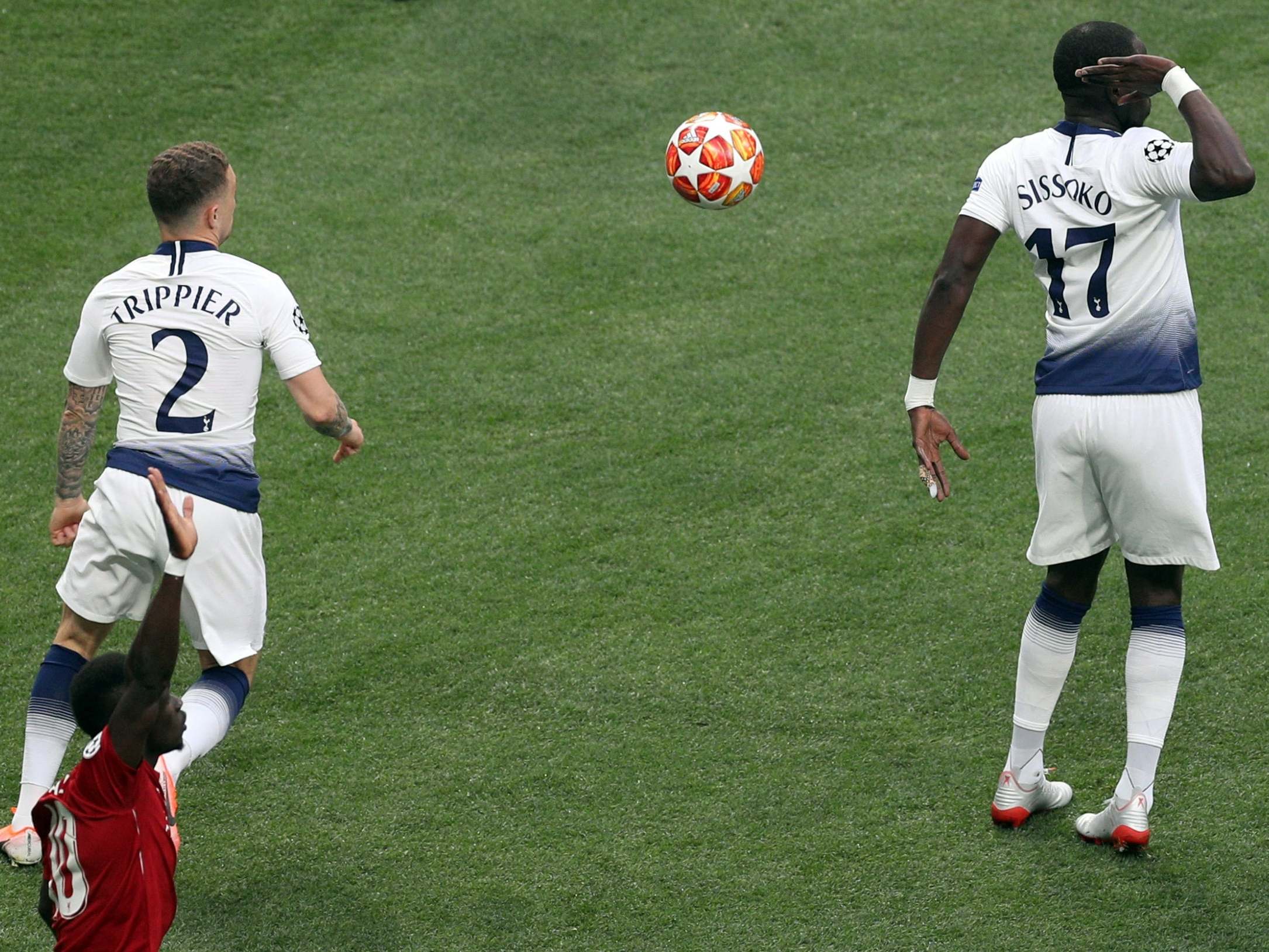Moussa Sissoko’s handball in Champions League final raises an important question – did Sadio Mane mean it?
If so, it may prove a deeply meaningful moment for football, way beyond just winning the sport’s greatest club trophy. And even if he didn’t, it points to a huge potential issue for the future

Your support helps us to tell the story
From reproductive rights to climate change to Big Tech, The Independent is on the ground when the story is developing. Whether it's investigating the financials of Elon Musk's pro-Trump PAC or producing our latest documentary, 'The A Word', which shines a light on the American women fighting for reproductive rights, we know how important it is to parse out the facts from the messaging.
At such a critical moment in US history, we need reporters on the ground. Your donation allows us to keep sending journalists to speak to both sides of the story.
The Independent is trusted by Americans across the entire political spectrum. And unlike many other quality news outlets, we choose not to lock Americans out of our reporting and analysis with paywalls. We believe quality journalism should be available to everyone, paid for by those who can afford it.
Your support makes all the difference.The only important question over the penalty decision that effectively won the 2019 Champions League final was over intent – but not regarding Moussa Sissoko. Whether he meant to handle the ball was utterly irrelevant to the laws, which indicated referee Damir Skomina had made absolutely the correct decision on Saturday night.
What is much more relevant to the rules – and the very future of the game – is whether Sadio Mane intended it. Did he mean to hit Sissoko’s arm with that chip?
If so, it may prove a deeply meaningful moment for football, way beyond just winning the sport’s greatest club trophy. And even if he didn’t, it points to a huge potential issue for the future, as well a possible unintended consequence that such changes to laws of the game can bring.
It has already meant that, even if the tactically smothered nature of a negative match was out of keeping with the raucous football from the Champions League season that built up to it, it was fitting in perhaps the most important way because of how the final was settled by one of the other main themes of the campaign. It was just the latest, and most high-profile and high-stakes, handball decision.
That theme started in the last 16, after Head of Uefa Referees Roberto Rosetti specifically told officials that he wanted this type of offence – where a player has their arm out so wide it does not allow the ball to pass – to be picked up on and punished. Again, intent is irrelevant. It is about players not gaining an advantage from an “unnatural” position – where a body part you cannot use in the game interferes with play.
There are two potential consequences of this, though, that the Sissoko moment crystallised. The first is that the most innocuous and – yes – natural of movements could become disproportionately influential.
If a player is merely pointing at an area he wants a teammate to run into – as they so often do, and as many felt Sissoko was doing on Saturday – it can give away a penalty. That is increasingly concerning because it is in itself so much more basic than the more difficult debate over how you “naturally” jump. It is really as organic a part of the game as picking the team, or choosing where to play the ball. The same applies to moments that bring in unconscious body language like demanding a pass, imploring a teammate to do something, or just remonstrating.
And it gives rise to the most important element of all of this, which makes the question of Mane’s intent so crucial. Will we now see players actually alter their attacking intentions, and try to hit the hands or the arms of the opposition?

Why not? It makes perfect sense to, but may lead to an imperfect aspect of the game. More matches might well be decided by referee guidance that doesn’t fundamentally promote in-play attacking; that instead encourages a more cynical calculation, that can target minor movements that wouldn’t usually have any kind of bearing on the actual football.
It would increase the effect of basic chance on the game, and potentially affect the focus of play. It could increase the element of chaos, maybe to a level of farce against what is actually desired from such rules.
Normally negligible movements could now have major impact, and cause the defending team to second-guess themselves in a way that doesn’t contribute to complete commitment to ‘play’, while causing the attacking side to constrain themselves and don’t necessarily bring proactive football.
This is the genuine danger of this move away from concentrating on intent with handball, as was the case for referees throughout most of the past few decades, and towards just the basic position of the arm.
“There will be some controversy over the decision but that is largely because people are still adjusting to how the handball rule is now interpreted,” former referee Keith Hackett said in a Sunday Telegraph column. “That will change as people get used to this sort of evolution in the Laws of the Game and we saw that with Liverpool’s second.”
But have attackers already got used to it, to maybe bring even more controversy?
With the guidance towards referees set to be formalised ahead of next season, it is going to be something that the authorities are – well – going to have to get a proper handle on. So moving away from intent with handball could influence football in a way no one intended.
Join our commenting forum
Join thought-provoking conversations, follow other Independent readers and see their replies
Comments